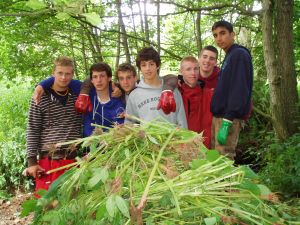An amazing 146 volunteers attended 46 organised events this summer to remove unwanted invaders from Eden’s waterways.
About 12 km of river bank have been treated during 2011, by hand pulling and spraying with herbicide. This has taken place on the River Eden at Carlisle, Lazonby and Armathwaite, the River Caldew at Dalston, and around Ullswater in the Glenridding and Patterdale areas.
Invasive non-native plants are spreading along our water bodies and damaging local wildlife. Examples of particular concern are Himalayan balsam and Japanese knotweed. These aggressive species smother our native plants and lead to serious erosion of the banks.
 In 2010 the Eden Invasive Species Group was set up to coordinate and expand efforts to control invasive non-native species in the Eden catchment. It has attracted excellent support from many local land owners, organisations and volunteers.
In 2010 the Eden Invasive Species Group was set up to coordinate and expand efforts to control invasive non-native species in the Eden catchment. It has attracted excellent support from many local land owners, organisations and volunteers.
Alison Reed of Eden Rivers Trust said, “It has been fantastic how all these different organisations and land owners have come together and achieved so much, with enormous help from volunteers. Working together we will have a far greater effect than any of us working in isolation.”
In July a fantastic event was organised in conjunction with Ullswater Steamers and their mascot, Sammy the Squirrel, on the shores of the lake. It was attended by 47 people who worked hard all day pulling up Himalayan balsam. They were rewarded with a free boat trip on the lake provided by Ullswater Steamers!
The event was aimed at involving local people and land owners, as well as visitors to the area, in the initiative. It was also aimed at raising awareness of the problem and particularly the “Check clean dry” campaign to prevent the spread of invasive non-native species from one water body to another.








